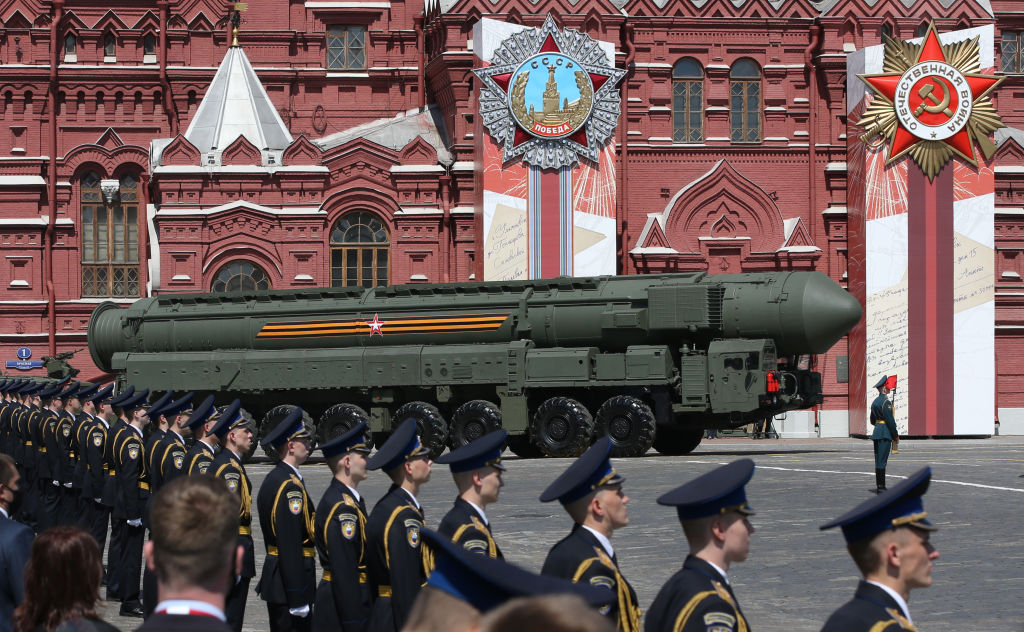
For months, as the war in Ukraine has ground increasingly towards stalemate, Russian foreign policy experts and media figures have pushed for a new kind of escalation: renewed nuclear tests. Just a few days ago, on Oct. 2, RT firebrand Margarita Simonyan said that Russia should test a nuclear weapon “someplace in Siberia” to send a “nuclear ultimatum” to the West.
On Oct. 5, Russian President Vladimir Putin addressed the growing calls for nuclear testing at a meeting of Russian foreign policy experts at the Valdai Discussion Club in Sochi. “I hear calls to start testing nuclear weapons, to return to testing,” Putin said. “I am not ready to say whether we really need to conduct tests or not, but it is possible theoretically to behave in the same way as the United States,” Putin said. Nuclear tests have not been conducted on Russian soil since 1990, a year before the collapse of the Soviet Union.
Russia is using nuclear saber-rattling as a way to get leverage on Ukraine, says Jeffrey Lewis, a nuclear nonproliferation expert at the Middlebury Institute of International Studies. “The Russians are trying to hold hostage anything they can to get their way on Ukraine,” he says.
Putin's statement came days after a U.S. proposal to allow international observers at American nuclear sites. The U.S. proposal, first reported by Bloomberg, was floated on the sidelines of an International Atomic Energy Agency meeting in Vienna last week. It would allow observers to monitor the U.S.'s so-called sub-critical experiments, arms tests that aim to verify weapons design without enough atomic material for a nuclear explosion to occur.
More From TIME
The proposal was the latest indicator of U.S. outreach on the issue. “We are open to hosting international observers for monitoring and verification research,” said National Nuclear Security Administration official Jill Hruby on June 19. She also said the Department is “open to working with others to develop a regime that would allow reciprocal observation with radiation detection equipment at each other’s subcritical experiments.”
But rather than leading to detente, the U.S. nuclear outreach has been met with new threats from Moscow. Since Russia’s full scale invasion of Ukraine on Feb. 24, 2022, arms control talks have stalled. Just months ago, President Vladimir Putin suspended New START, the last agreement with the U.S. that limited nuclear arsenals.
Deputy Foreign Minister Sergei Ryabkov, Moscow's top arms control negotiator, said on Oct 2. that Russia hadn't even received a concrete proposal to participate in monitoring and verification in the U.S. but dismissed the possibility out of hand. “There can be no correction here, depending on whether certain proposals are received or not,” Rybakov said.
Russia and the U.S. continue to abide by the Comprehensive Test Ban Treaty (CTBT), which established an international legal norm against nuclear weapons testing. But the treaty does not come into force until eight key countries including the U.S. ratify the agreement. Russian officials have long maintained that negotiations about the moratorium on nuclear tests should happen after the CTBT comes into force. Russia would have treated the United States’ monitoring offer “with great skepticism even in much better times, preferring to point out that the US hasn't ratified CTBT,” says Pavel Podvig, an expert on Russia’s nuclear policy.
In Putin's speech at the Valdai Club, which lasted almost four hours, Putin said there was “no need” to change the country's nuclear doctrine, but mused about revoking Russia's ratification of the CTBT treaty. “Theoretically, it is possible to revoke the ratification of the nuclear test ban,” the Russian president said. Putin also claimed that Russia had completed a "final successful test" of an experimental nuclear-capable ballistic missile known as the Burevestnik.
With limited prospects for arms controls discussions, the U.S. and Russia look poised to continue increasing their nuclear activity on a number of fronts. Both countries, as well as China, have rapidly been expanding facilities and tunnels at their nuclear test sites in the last years, raising speculation that the world’s most powerful nuclear powers may be closer to restarting nuclear weapons testing than they have been since the 1990s.
Some experts nonetheless believe it's worth continuing to push for negotiations, as strident announcements from Russian officials don't necessarily align with its underlying strategic interests. “It's in Russia's interest as well as the United States’ interest to understand and to be assured" about each other's nuclear programs, says Daryl G. Kimball, Executive Director of the Arms Control Association.
The United States and Russia have been able to put aside their differences to engage with each other on nuclear arms control in the past, says Kimball. In the midst of the Vietnam War, while the USSR was supplying the North Vietnamese with heavy weaponry, the first U.S.-USSR Strategic Arms Control agreement was negotiated between Moscow and Washington D.C. “The two sides sat down for weeks and weeks in Helsinki and hammered out this agreement. That’s what’s possible if the two sides recognize the value of negotiations and the nuclear constraints they can produce,” says Kimball.
More Must-Reads from TIME
- Cybersecurity Experts Are Sounding the Alarm on DOGE
- Meet the 2025 Women of the Year
- The Harsh Truth About Disability Inclusion
- Why Do More Young Adults Have Cancer?
- Colman Domingo Leads With Radical Love
- How to Get Better at Doing Things Alone
- Michelle Zauner Stares Down the Darkness
Contact us at letters@time.com